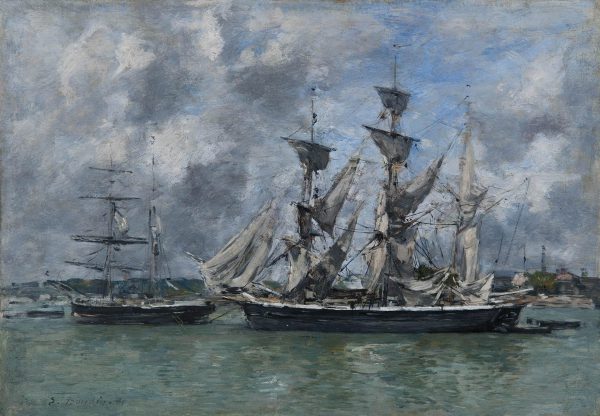Three-masted ship in port, 1880
Oil on canvas, H. 0.23 m; W. 0.32 m
Signed lower left: E. Boudin. 80.
Provenance: Piaggi Collection, Paris.
Private collection.
R. Schmit, Eugène Boudin, 1824-1898, catalogue raisonné de l’œuvre peint, Paris, 1973, t. II, p. 30, no. 1319 (ill.).
Boudin was born in Normandy into a family whose life revolved around the sea. In 1844, he opened a stationery shop that became a centre for local artists. He came into contact with artists such as Constant Troyon, Thomas Couture and Eugène Isabey, who encouraged him to pursue his own artistic explorations.
In 1851, the city of Le Havre granted him a three-year scholarship to allow him to study in Paris, but he spent most of his time outside of the city, travelling to Rouen, Le Havre, Honfleur and Caen to immerse himself in a natural setting more compatible with his interest in plein air painting. For him, three strokes of the brush in plein air were worth more than two days of work at the easel in the studio. In 1859, Boudin debuted at the Salon with Pardon de Sainte Anne Palud. He travelled to the popular sites of Trouville and Deauville, where he completed several sketches and paintings of beach scenes, focusing on the permutations of the sky and effects of the environment and weather. In the late 1860s he devoted himself entirely to studies of the sky and boats.
He continued exhibiting at the Salon after his debut in 1859 and also got involved in other exhibitions in many French cities. In 1874, he exhibited his works simultaneously at the Salon and the avant-garde exhibition at Nadar’s. This was the only Impressionist exhibition in which Boudin participated, but it constituted an important moment: it revealed the relationships between the past and future trends of French artists, with Boudin acting as an important link between the two. 1881 marked the beginning of the public’s official interest in his works, when he established a permanent relationship with Paul Durand-Ruel, a consistent sponsor of his work. Boudin continued submitting works to the Salon until his death in 1898.
Many of Boudin’s paintings can be found in the Musée Eugène Boudin in Honfleur, the Musée d’Orsay and the Louvre in Paris, and in numerous other provincial museums throughout France. His work is also part of several American collections including the Metropolitan Museum of Art.
In this painting, Boudin aims to capture the light of the port and its cloudy atmosphere, shifting and shapeless.
Loyal to his nickname, “king of skies”, bestowed upon him by Corot, Boudin indeed focused above all on rendering clouds and skies. He did lengthy studies of these elements in pastel and wrote of them in his sketchbooks: “Swim in the sky; render the ‘tenderness’ of the cloud. Suspend these background shapes, far off in the grey haze…”
The water, barely rippled by the sea breeze, reflects the influence of the sky. Flowing and transient reflections are suggested with the help of a light brushstroke and a nuanced harmony of grey, blue and green tones.

